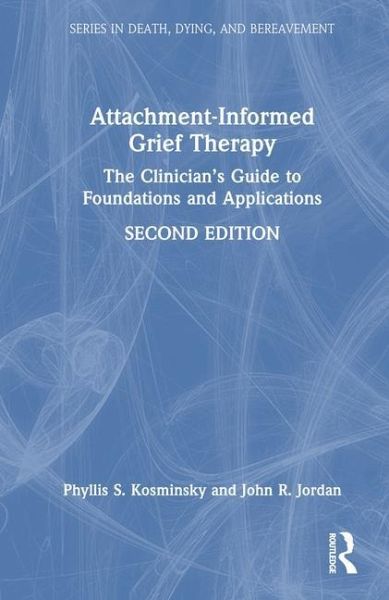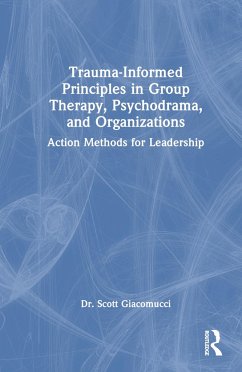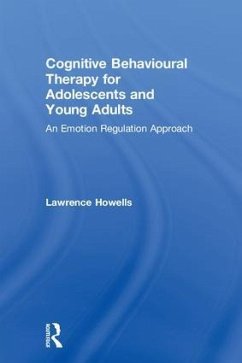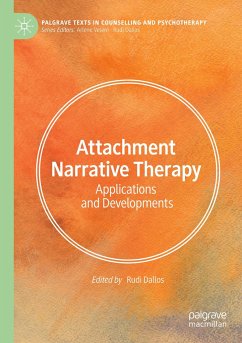Attachment-Informed Grief Therapy
The Clinician's Guide to Foundations and Applications
Versandkostenfrei!
Versandfertig in 1-2 Wochen
Weitere Ausgaben:

PAYBACK Punkte
79 °P sammeln!





Attachment-Informed Grief Therapy bridges the fields of attachment studies, thanatology, and interpersonal neuroscience, uniting theory, research, and practice to enrich our understanding of how we can help the bereaved.
Phyllis S. Kosminsky is a clinical social worker specializing in work with the bereaved, particularly those who have experienced a traumatic loss. Over the past 30 years, Dr Kosminsky has provided bereavement counseling to individuals, conducted grief support groups, and provided trainings for mental health professionals in the treatment of normal and problematic grief. Her publications include journal articles, book chapters, and the book Getting Back to Life When Grief Won't Heal. John R. Jordan is a retired psychologist in private practice in Rhode Island, where he specialized in work with survivors of suicide and other traumatic losses for almost 40 years. He was the clinical consultant for Grief Support Services of the Samaritans in Boston, Massachusetts, and the professional advisor to the Loss and Bereavement Council of the American Foundation for Suicide Prevention. He has published over 45 articles, chapters, and full books, including Grief After Suicide: Coping with Consequences and Caring for the Survivors and After Suicide Loss: Coping with Your Grief.
Produktdetails
- Verlag: Routledge
- 2. Auflage
- Seitenzahl: 362
- Erscheinungstermin: 14. Dezember 2023
- Englisch
- Abmessung: 235mm x 157mm x 24mm
- Gewicht: 675g
- ISBN-13: 9781032038469
- ISBN-10: 1032038462
- Artikelnr.: 68714052
Herstellerkennzeichnung
Libri GmbH
Europaallee 1
36244 Bad Hersfeld
gpsr@libri.de
"Attachment-Informed Grief Therapy is a fascinating book! Kosminsky and Jordan have written a scientifically sound, clinically innovative, well-argued, and extremely informative volume. The authors show how insights from attachment theory and neuroscience are the keys that unlock the puzzle of healthy and disordered grief responses, and how, through understanding unmet attachment needs, attachment-related emotions and defenses, and the broaden-and-build repercussions of attachment security, grief therapists can help bereaved clients to manage their grief reactions and to find ways to move forward. I enjoyed reading this gracefully written and profound book and I strongly believe that it will become essential reading for clinicians,
Mehr anzeigen
researchers, and students interested in the study and treatment of disordered grief."
Mario Mikulincer, professor of psychology, Baruch Ivcher School of Psychology, Reichman University, Israel
"In this remarkable revision of their ground-breaking volume, Phyllis Kosminsky and Jack Jordan penetrate still more profoundly into the developmental, interpersonal, and intersubjective neurobiological underpinnings of attachment that give rise and form to all grief. More than a compendium of clinical wisdom and contemporary theory and research, Attachment-Informed Grief Therapy provides resonant insights and concrete principles for helping clients read the deep text of their own needs in the wake of loss. Equally, it instructs the reader in how to become the secure base that allows survivors to integrate the rupture and realign the bond with a significant other who is present even in absence. I, for one, am a better therapist and companion to those who mourn for the gift of their vision."
Robert A. Neimeyer, PhD, co-editor of The Handbook of Grief Therapy and director of The Portland Institute for Loss and Transition
"The second edition of this important volume is a valuable resource for clinicians and researchers alike. Updating, expanding, and deepening their understanding of the interface between attachment styles and the processing of bereavement, Kosminsky and Jordan's integration of new findings from neuroscience adds an important dimension to their overview. The ample clinical material included is accompanied by rich and thoughtful consideration of the cases at hand. Accompanying these exemplary clinicians as they weave together theory, research and practice on bereavement will enrich the therapeutic encounter for therapists at all stages of their professional development."
Simon Shimshon Rubin, PhD, director of the International Laboratory for the Study of Loss, Bereavement, and Human Resilience at the University of Haifa, Israel, and co-author of Working with the Bereaved: Multiple Lenses on Loss and Mourning
"Reading this book in one stitting, as I did, left me moved. It starts with a crystal-clear exposition of contemporary attachment theory and its neuroscience basis, defines and easy-to-understand attachment framework for helping bereaved people, and shows how sensitive therapy can help overcome physiological dysregulation and restore meaning. Convincing clinical illustrations are used throughout, contributing to an overall sense of two vastly experienced clinicians passing on deep theoretical and practical expertise to the next generations. Strongly recommended."
Jeremy Holmes, MD, FRCPsych, University of Exeter, United Kingdom, and author of Exploring in Security: Towards an Attachment-Informed Psychoanalytic Psychotherapy
"Grief, that harrowing experience after the death of a loved one, is again beautifully described in the second edition of Attachment-Informed Grief Therapy. What the authors have accomplished in this edition will continue to enrich how clinicians work with the grief-stricken and will provide them with an expanded knowledge of how attachment shapes the experience of grief in bereavement. And Kosminsky and Jordan do more. The rhythm of the writing combined with their clarity and deftness in explicating theory and neuroscience make Attachment-Informed Grief Therapy a book that is a pleasure to read."
Dorothy Holinger, PhD, author of The Anatomy of Grief
"In the second edition of this groundbreaking volume, Phyllis Kosminsky and John Jordan show us how to help our clients navigate the landscape of life, with all of its fault lines. Filled with deep empathy and wisdom, Attachment-Informed Grief Therapy is a book that will inform and inspire anyone who is in a position to offer support to people dealing with significant loss or with other difficult and painful losses."
Jakob van Wielink, The School for Transition, The Netherlands, and co-author of Loss, Grief, and Attachment in Life Transitions: A Clinician's Guide to Secure Base Counseling
"This volume provides a wonderful intergration of the concepts related to attachment, current theories of grief, and contemporary neuroscience. The book answered questions about attachment and therapy that I didn't even know that I had! It is an absolute must-read for any clinician who wishes to enhance their practice and provide sensitive and well-informed support to those who are grieving."
Darcy Harris, PhD, professor, Thanatology Department, King's University College at Western University and co-editor of the Routledge Series in Death, Dying, and Bereavement
"Finally! In an extraordinary blend of scholarship and clinical acumen, the rich store of information located in attachment theory/research has been retrieved and integrated with what the bereaved specifically require in the aftermath of significant loss. Synthesizing developmental psychology, traumatology, thanatology, neuroscience, and therapy research, Kosminsky and Jordan brilliantly elucidate the mourner's experience and needs, along the way operationalizing what clinicians must know to intervene successfully to promote healthy adaptation. Practical and cutting edge, this book makes a revolutionary contribution and will become required reading for those working with all kinds of loss."
Therese Rando, PhD, BCETS, BCBT, founder and clinical director, The Institute for the Study and Treatment of Loss, Warwick Rhode Island, and author of Coping with the Sudden Death of Your Loved: A Self-Help Handbook for Traumatic Bereavement
"Attachment-Informed Grief Therapy is a must-read for grief counselors. This is a book that every therapist should have in his or her library and one they will consult regularly."
Kenneth J. Doka, PhD, senior consultant to the Hospice Foundation of America and author of Grief is a Journey: Finding Your Path Through Loss
"This is an exceptional text! Written by two highly skilled clinicians, it presents the state of the art in attachment theory and bereavement in both a highly engaging and practical form. This book effectively bridges both research and practice and attachment and thanatology in a way that no other texts have previously done. Richly illustrated with clinical examples, this impressive book will enrich the understanding and skills of both beginning and experienced clinicians."
Christopher Hall, MA, BEd, chief executive officer of the Australian Centre for Grief and Bereavement
Mario Mikulincer, professor of psychology, Baruch Ivcher School of Psychology, Reichman University, Israel
"In this remarkable revision of their ground-breaking volume, Phyllis Kosminsky and Jack Jordan penetrate still more profoundly into the developmental, interpersonal, and intersubjective neurobiological underpinnings of attachment that give rise and form to all grief. More than a compendium of clinical wisdom and contemporary theory and research, Attachment-Informed Grief Therapy provides resonant insights and concrete principles for helping clients read the deep text of their own needs in the wake of loss. Equally, it instructs the reader in how to become the secure base that allows survivors to integrate the rupture and realign the bond with a significant other who is present even in absence. I, for one, am a better therapist and companion to those who mourn for the gift of their vision."
Robert A. Neimeyer, PhD, co-editor of The Handbook of Grief Therapy and director of The Portland Institute for Loss and Transition
"The second edition of this important volume is a valuable resource for clinicians and researchers alike. Updating, expanding, and deepening their understanding of the interface between attachment styles and the processing of bereavement, Kosminsky and Jordan's integration of new findings from neuroscience adds an important dimension to their overview. The ample clinical material included is accompanied by rich and thoughtful consideration of the cases at hand. Accompanying these exemplary clinicians as they weave together theory, research and practice on bereavement will enrich the therapeutic encounter for therapists at all stages of their professional development."
Simon Shimshon Rubin, PhD, director of the International Laboratory for the Study of Loss, Bereavement, and Human Resilience at the University of Haifa, Israel, and co-author of Working with the Bereaved: Multiple Lenses on Loss and Mourning
"Reading this book in one stitting, as I did, left me moved. It starts with a crystal-clear exposition of contemporary attachment theory and its neuroscience basis, defines and easy-to-understand attachment framework for helping bereaved people, and shows how sensitive therapy can help overcome physiological dysregulation and restore meaning. Convincing clinical illustrations are used throughout, contributing to an overall sense of two vastly experienced clinicians passing on deep theoretical and practical expertise to the next generations. Strongly recommended."
Jeremy Holmes, MD, FRCPsych, University of Exeter, United Kingdom, and author of Exploring in Security: Towards an Attachment-Informed Psychoanalytic Psychotherapy
"Grief, that harrowing experience after the death of a loved one, is again beautifully described in the second edition of Attachment-Informed Grief Therapy. What the authors have accomplished in this edition will continue to enrich how clinicians work with the grief-stricken and will provide them with an expanded knowledge of how attachment shapes the experience of grief in bereavement. And Kosminsky and Jordan do more. The rhythm of the writing combined with their clarity and deftness in explicating theory and neuroscience make Attachment-Informed Grief Therapy a book that is a pleasure to read."
Dorothy Holinger, PhD, author of The Anatomy of Grief
"In the second edition of this groundbreaking volume, Phyllis Kosminsky and John Jordan show us how to help our clients navigate the landscape of life, with all of its fault lines. Filled with deep empathy and wisdom, Attachment-Informed Grief Therapy is a book that will inform and inspire anyone who is in a position to offer support to people dealing with significant loss or with other difficult and painful losses."
Jakob van Wielink, The School for Transition, The Netherlands, and co-author of Loss, Grief, and Attachment in Life Transitions: A Clinician's Guide to Secure Base Counseling
"This volume provides a wonderful intergration of the concepts related to attachment, current theories of grief, and contemporary neuroscience. The book answered questions about attachment and therapy that I didn't even know that I had! It is an absolute must-read for any clinician who wishes to enhance their practice and provide sensitive and well-informed support to those who are grieving."
Darcy Harris, PhD, professor, Thanatology Department, King's University College at Western University and co-editor of the Routledge Series in Death, Dying, and Bereavement
"Finally! In an extraordinary blend of scholarship and clinical acumen, the rich store of information located in attachment theory/research has been retrieved and integrated with what the bereaved specifically require in the aftermath of significant loss. Synthesizing developmental psychology, traumatology, thanatology, neuroscience, and therapy research, Kosminsky and Jordan brilliantly elucidate the mourner's experience and needs, along the way operationalizing what clinicians must know to intervene successfully to promote healthy adaptation. Practical and cutting edge, this book makes a revolutionary contribution and will become required reading for those working with all kinds of loss."
Therese Rando, PhD, BCETS, BCBT, founder and clinical director, The Institute for the Study and Treatment of Loss, Warwick Rhode Island, and author of Coping with the Sudden Death of Your Loved: A Self-Help Handbook for Traumatic Bereavement
"Attachment-Informed Grief Therapy is a must-read for grief counselors. This is a book that every therapist should have in his or her library and one they will consult regularly."
Kenneth J. Doka, PhD, senior consultant to the Hospice Foundation of America and author of Grief is a Journey: Finding Your Path Through Loss
"This is an exceptional text! Written by two highly skilled clinicians, it presents the state of the art in attachment theory and bereavement in both a highly engaging and practical form. This book effectively bridges both research and practice and attachment and thanatology in a way that no other texts have previously done. Richly illustrated with clinical examples, this impressive book will enrich the understanding and skills of both beginning and experienced clinicians."
Christopher Hall, MA, BEd, chief executive officer of the Australian Centre for Grief and Bereavement
Schließen
Für dieses Produkt wurde noch keine Bewertung abgegeben. Wir würden uns sehr freuen, wenn du die erste Bewertung schreibst!
Eine Bewertung schreiben
Eine Bewertung schreiben
Andere Kunden interessierten sich für














